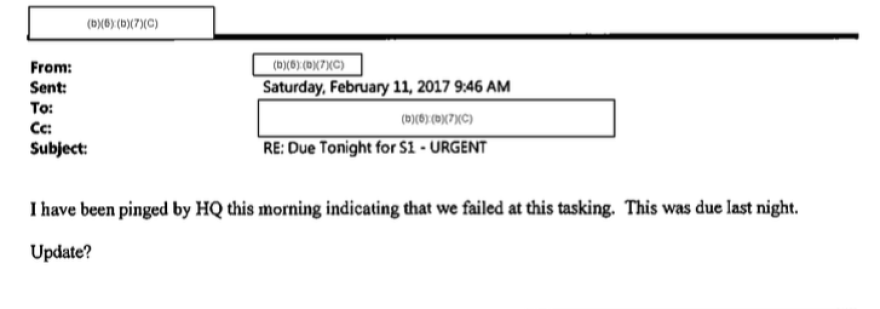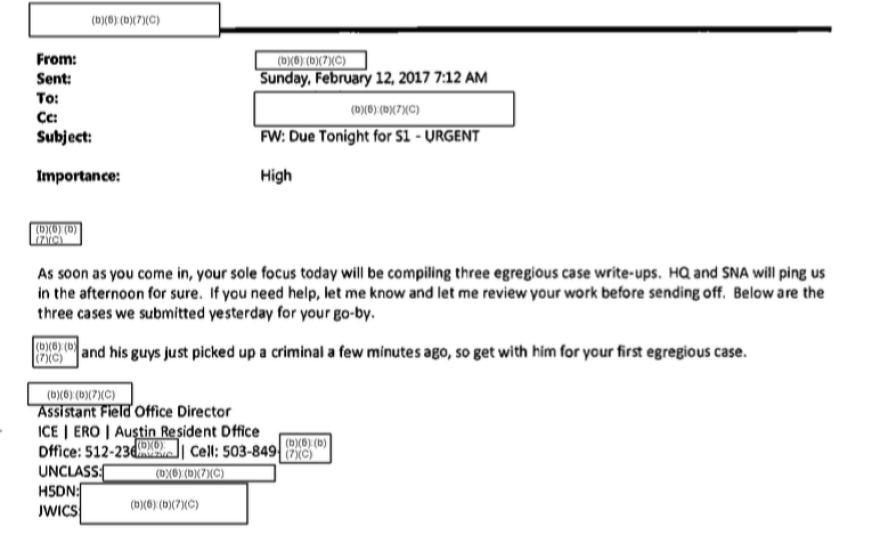Internal emails between U.S. Immigration and Customs Enforcement officials show that Austin-area immigration officials tried to highlight the most “egregious” cases of suspected undocumented immigrants picked up during two days of immigration raids in February.
Fifty-one people were arrested in those raids.
The heavily-redacted emails, obtained by Vanderbilt Law School students through a public information request, were published first by The Intercept. They were provided to KUT by Bob Libal, executive director of local immigrants’ rights group, Grassroots Leadership.
"I really do think they're trying to treat this as, like, a PR thing," said Libal, who received the emails from Vanderbilt about six weeks ago.
While the emails begin in late January, the ones concerning which cases ICE would highlight begin on the second day of the raid in Austin, Feb. 10. That evening, an acting chief of staff with ICE’s Enforcement and Removal Operations division sent an urgent email.

Twenty minutes later, someone (the name and email of the sender have been redacted) clarified that each field office would need to complete the task ASAP.

A Deputy Chief of Staff in ICE’s San Antonio Field Office followed up.

On Saturday morning, someone responded acknowledging they had missed the deadline.

The office in San Antonio responded a couple hours later with their “egregious cases,” to which someone replied that those cases didn’t apply. The San Antonio office sent back a revised reply.

Early Sunday, an Assistant Field Office Director in the Austin office reiterating that agents needed to submit their “three egregious case write-ups.”

The majority of the emails released dealt with ICE’s response to media inquiries about the raids on Austin. Two Austin City Council members were mentioned in these emails, including Council Member Greg Casar, who represents a district that ICE focused on during the raid, and Council Member Ellen Troxclair, who represents Southwest Austin.
A Texas Tribune reporter asked for a comment from ICE about a public statement Casar made. ICE officials forwarded that along, telling other officials to “Please be careful.”

A district coordinator in Troxclair’s office reached out to ICE, asking for clarification on media reports of ICE raids. The city employee gives ICE some advice, including “…it might be useful information to know whether the pace or focus of immigration-related arrests is a new phenomenon associated with the change in federal-level leadership, or is a continuation of the previous administration’s policies.”

A director in Troxclair’s office clarified Thursday that no ICE raids had occurred in the Council Member’s district and that “[T]he email you reference was confirming the validity of a number of media reports that surfaced at the time about ICE activity in Austin.”
On Feb. 13, ICE did highlight three cases in the Austin area.
A citizen of Mexico previously removed from the United States, who was convicted of aggravated assault. A citizen of El Salvador who pled guilty to the sexual assault of a child. A citizen of Mexico convicted of domestic violence charges as a repeat offender.
“ICE clearly and directly communicates priority groups for various operations," wrote ICE spokesperson Nine Pruneda in an email. "Any suggestions that the agency intentionally misled individuals about target populations are completely false. ICE provides examples of significant arrests to proactively meet requests for this information; however, those examples are accompanied by a list of target groups. In the case of the February 2017 operation, the targeted groups of criminal aliens, illegal re-entrants, and immigration fugitives were listed in the headlines of each local announcement."




